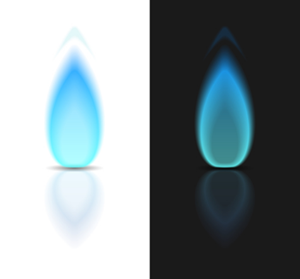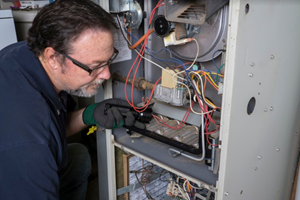 Heating your home with natural gas is one of the most popular options as more than 57% of American households have a natural gas furnace. Yet, even though you may have lived with a natural gas heating system in your home your entire life, you may not know much about how it operates or how safety issues involving the unit affect operation.
Heating your home with natural gas is one of the most popular options as more than 57% of American households have a natural gas furnace. Yet, even though you may have lived with a natural gas heating system in your home your entire life, you may not know much about how it operates or how safety issues involving the unit affect operation.
Natural gas is generally a safe and efficient fuel. However, it is important to realize the dangers that accompany its usage. Combustible gas can be unintentionally released into your home’s atmosphere.
When natural gas is used as a fuel source, not all of the supply is used to heat your home. Some of it is wasted into the atmosphere through the combustion process. Typically, consumers will see an AFUE rating on new furnaces. The acronym stands for annual fuel utilization efficiency. In other words, a heating system with an AFUE of 90 will burn 90% of natural gas for heat while the other 10% goes up as waste. It’s the waste product that can cause problems.
Risk Of Carbon Monoxide Poisoning
When appliances using natural gas are poorly maintained or improperly used, they emit dangerous carbon monoxide. This includes natural gas furnaces. Carbon monoxide begins to build within a house when a furnace does not burn gas in the right manner. It also does this when it’s not vented properly. Those who breath excessive amounts of carbon monoxide can quickly become sick and incapacitated, and when levels are high enough, it can even result in death. Carbon monoxide poisoning symptoms are similar to those of the flu, but occur without a fever. When this happens, call emergency medical services immediately.
Maintaining Your Furnace Prevents Problems
To prevent your furnace from emitting dangerous carbon dioxide fumes, properly maintain it by checking for the following:
- The vent pipe and chimney is not broken or obstructed
- Make sure furnace flames are blue; if they are yellow, you may have a venting problem
- Carbon monoxide and smoke detectors near the furnace and vents should be operating properly
- Clean all dirt, soot and corrosion from the furnace
- The heat exchanger should be clear and clear of debris
- Keep the area around the furnace clear of objects and dirt
- Use a clean filter and install it correctly
Heater Repair Services South Brunswick NJ
 In addition to doing maintenance on your own, make sure that you have a certified technician to check your furnace annually. They check for cracks in the furnace structure that can end up emitting carbon dioxide into your home. Another area that needs attention is the gas line. The gas line supplies the fuels that come into your furnace. Gas lines can develop leaks. The smell of rotten eggs indicates that you have a gas leak. Normally, natural gas is odorless, so utilities add that smell to ensure that people know when natural gas is present. Because natural gas is combustible, it can can result in an explosion when too much of the fuel builds up in an enclosed area. Have the lines inspected regularly to avoid dangerous situations.
In addition to doing maintenance on your own, make sure that you have a certified technician to check your furnace annually. They check for cracks in the furnace structure that can end up emitting carbon dioxide into your home. Another area that needs attention is the gas line. The gas line supplies the fuels that come into your furnace. Gas lines can develop leaks. The smell of rotten eggs indicates that you have a gas leak. Normally, natural gas is odorless, so utilities add that smell to ensure that people know when natural gas is present. Because natural gas is combustible, it can can result in an explosion when too much of the fuel builds up in an enclosed area. Have the lines inspected regularly to avoid dangerous situations.
Not only do you need to have your system professionally maintained but it is also important that you call for a heater repair when you notice that your system is malfunctioning. Be sure to contact a reputable and reliable HVAC company to do all of the work on your heating system.
Princeton Heating & Air Conditioning has been in business since the 196os and since then, we have been creating positive customer experiences. We offer a wide variety of services, including heater tune-ups, HVAC system installations, and heater repair services. When you call us, you can rest assured that you will have a professionally Nate-certified specialist to address your home comfort needs. Give us a call today to take advantage of our high quality and affordable services. We are among the few providers in NJ to hold a Carrier Presidents Award Dealer distinction. Be sure to call us and speak with one of our comfort specialists today if you have any questions.

Contact us now at (800) 253-9001 to find out more!




